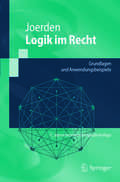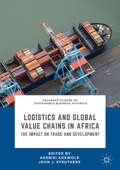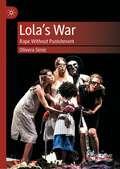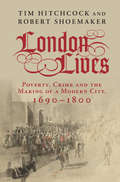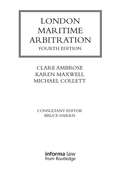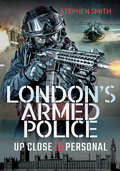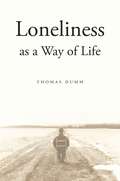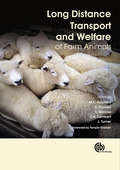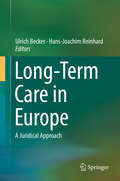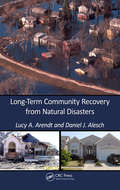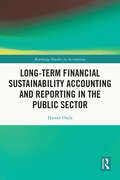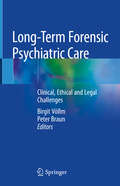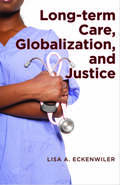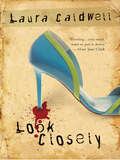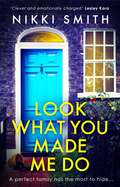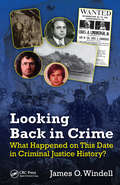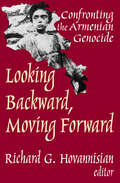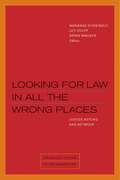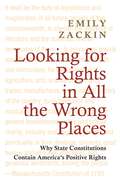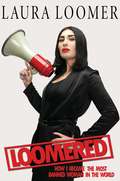- Table View
- List View
Logik im Recht
by Jan C. JoerdenIn dem Lehr- und Studienbuch zeigt der Autor, in welchem Maße logische Strukturen das Rechtsdenken bestimmen. Er erläutert die wesentlichen logischen Grundlagen und ihre Anwendung auf dem Gebiet des Rechts. Zum einen führt dies zu einem tieferen Verständnis der juristischen Dogmatik und einer systematischen Durchdringung des Rechtsstoffs, zum anderen tragen die Überlegungen zwischen Logik und Rechtswissenschaft zu neuen Erkenntnissen bei. Behandelt werden verschiedene Strukturen des Rechts, u. a. relationenlogische und syllogistische Strukturen.
Logistics and Global Value Chains in Africa: The Impact on Trade and Development (Palgrave Studies of Sustainable Business in Africa)
by Adebisi Adewole John J. StruthersFocusing on global value chains and their importance to trade, this edited collection explores the strategic role of logistics and supply chain infrastructure in the development of Africa. Skilled authors present critical analysis of the current state of logistics in Africa, and suggest improvements to policy and practice which address the issue of poor trading relationships. This book will engage entrepreneurs, academics and policy-makers interested in international business, raising awareness of the need for better trade infrastructure in Africa in order to ensure the continent’s economic development.
Lola’s War: Rape Without Punishment
by Olivera SimicThis longitudinal study is based on the story of Lola, who was gang raped during the war in Bosnia and Herzegovina in 1992. At the time, she was in a detention camp with her young children. Only one of Lola’s several perpetrators was convicted but his sentence of six years of imprisonment has never been actioned by the Bosnian judiciary. Lola’s rapist is still free and she lives in continual fear that he will retaliate against her and her children for her role in his trial.
London Lives
by Tim Hitchcock Robert ShoemakerLondon Lives is a fascinating new study which exposes, for the first time, the lesser-known experiences of eighteenth-century thieves, paupers, prostitutes and highwaymen. It charts the experiences of hundreds of thousands of Londoners who found themselves submerged in poverty or prosecuted for crime, and surveys their responses to illustrate the extent to which plebeian Londoners influenced the pace and direction of social policy. Calling upon a new body of evidence, the book illuminates the lives of prison escapees, expert manipulators of the poor relief system, celebrity highwaymen, lone mothers and vagrants, revealing how they each played the system to the best of their ability in order to survive in their various circumstances of misfortune. In their acts of desperation, the authors argue that the poor and criminal exercised a profound and effective form of agency that changed the system itself, and shaped the evolution of the modern state.
London Maritime Arbitration (Lloyd's Shipping Law Library)
by Clare Ambrose Karen Maxwell Michael CollettNow in its fourth edition, this book provides detailed and practical guidance on how London Maritime Arbitration works in practice, against the background of English arbitration law and the Arbitration Act 1996. This unique title is the only book on the market that offers a practical focus on maritime disputes, while also providing a clear exposition of general principles of English arbitration law, with discussion and analysis of applicable legislation and case law. Arbitration practitioners will find everything that they need in one comprehensive book. New to this edition: Guidance on the new LMAA Terms 2017 against the background of English arbitration law, including the Arbitration Act 1996. Fully updated case law and analysis of legal developments, including Brexit. Comparative references to ad hoc and LCIA arbitration. New section on salvage arbitration, Brexit, third party funding. Summaries comparing alternative jurisdictions including Singapore, Hong Kong, Hamburg and New York This book will be invaluable to maritime arbitration practitioners both in private practice and in-house, as well as maritime professionals, such as those working at P&I Clubs, brokers, ship owners, managers and charterers; and more generally to anybody concerned with London arbitration.
London's Armed Police: Up Close and Personal
by Stephen SmithAn insider&’s account of an elite unit fighting crime and terror on the streets of London—includes hundreds of photos. In this book, veteran firearms officer Stephen Smith goes behind the scenes of the Metropolitan Police&’s Specialist Firearms Unit, CO19—covering a wide range of events in recent history, from the controversial shootings of Azelle Rodney in 2005 and Mark Duggan in 2011 to the terrorist attacks on Westminster, London Bridge and Borough Market, as well as stories from decades past. Through his unique access to CO19, Smith has managed to put together hundreds of detailed photographs, both historical and contemporary, along with text that goes a long way to explain why it is necessary to have such an elite firearms unit on standby 24/7 in London. This comprehensive volume will bring you up-to date with the training, operations, equipment, and mindset of these courageous individuals who put their lives on the line on a daily basis to keep London safe.
Loneliness as a Way of Life
by Thomas Dumm“What does it mean to be lonely?” Thomas Dumm asks. His inquiry, documented in this book, takes us beyond social circumstances and into the deeper forces that shape our very existence as modern individuals. The modern individual, Dumm suggests, is fundamentally a lonely self. Through reflections on philosophy, political theory, literature, and tragic drama, he proceeds to illuminate a hidden dimension of the human condition. His book shows how loneliness shapes the contemporary division between public and private, our inability to live with each other honestly and in comity, the estranged forms that our intimate relationships assume, and the weakness of our common bonds. A reading of the relationship between Cordelia and her father in Shakespeare’s King Lear points to the most basic dynamic of modern loneliness—how it is a response to the problem of the “missing mother.” Dumm goes on to explore the most important dimensions of lonely experience—Being, Having, Loving, and Grieving. As the book unfolds, he juxtaposes new interpretations of iconic cultural texts—Moby-Dick, Death of a Salesman, the film Paris, Texas, Emerson’s “Experience,” to name a few—with his own experiences of loneliness, as a son, as a father, and as a grieving husband and widower. Written with deceptive simplicity, Loneliness as a Way of Life is something rare—an intellectual study that is passionately personal. It challenges us, not to overcome our loneliness, but to learn how to re-inhabit it in a better way. To fail to do so, this book reveals, will only intensify the power that it holds over us.
Long Distance Transport and Welfare of Farm Animals
by Michael C. Appleby V. Cussen J. TurnerAround 60 billion animals are bred for food each year worldwide and more than a billion are transported, often over long distances, every week. However, awareness and understanding of animal welfare, the factors that affect it and the correlation between it and other issues such as food safety and quality are increasing. Long distance transport can cause both physical and mental problems in animals and promoting animal welfare will be beneficial to both the animals and the agricultural and processing industries. In conjunction with a global coalition of NGOs working on animal transport and welfare, this volume brings together studies from well known animal scientists and researchers to review the implications and necessity of long distance animal transport for slaughter. Authoritative reports on regional practices are combined with discussions of the science, economics, legislation and procedures involved in this practice. This review will be essential for researchers and professionals within animal production and welfare as well as veterinary science.
Long-Term Care
by Joseph MatthewsFinding the right long-term care often means making difficult decisions during difficult times. Whether you're planning for the future or need to make a quick decision, Long-Term Care helps you understand the alternatives to nursing facilities and shows you how to find the best care you can afford. With Long-Term Care, you'll be able to: evaluate long-term care insurance arrange home care explore options beyond nursing homes choose a nursing facility get the most out of Medicare, Medicaid and other benefit programs protect your assets, and recognize and prevent elder fraud. This completely updated edition includes an expanded discussion of Medicaid coverage, special long-term care insurance, assisted living, and long-term care. Plus, you'll get up-to-date benefit numbers, laws and taxes, and revised information on veterans' benefits. With sensitivity and clarity, Attorney Joseph Matthews gives you everything you need to help plan for and make the best arrangements for long-term care.
Long-Term Care in Europe: A Juridical Approach
by Ulrich Becker Hans-Joachim ReinhardThis book provides a comprehensive overview on the long-term care systems in 12 EU member states and Norway. Focusing on the legal background and its main principles, it includes a comparative analysis which highlights the principal dissimilarities between European long term care benefits, but at the same time also a variety of features in common. It also discusses the increasingly transnational dimension of long-term as a result of migrants returning to their country of origin in old age, and the still-unsolved legal problem of entitlement to long-term care benefits in another EU-member state.
Long-Term Care: How to Plan & Pay for It
by Joseph MatthewsGet the best care, in the right place, at the right price To find the right kind of long-term care, you may need to make difficult personal, medical, and financial decisions during emotionally tough times. Long-Term Care helps you and your family understand the range of available choices. Even more important, it guides you toward the best care you can afford. You’ll learn how to: explore your options for home care, assisted living, and nursing homes get the most out of Medicaid, Medicare, and veterans’ programs evaluate whether long-term care insurance is worth the significant expense consider the special needs of loved ones with dementia or Alzheimer’s, and protect your loved ones from elder fraud. The 13th edition is completely updated with the latest long-term care costs, Medicaid rules, and resources.
Long-Term Care: How to Plan and Pay for It (11th Edition)
by Joseph Matthews<p>To find the right kind of long-term care, you may need to make difficult personal, medical, and financial decisions during emotionally tough times. <i>Long-Term Care</i> helps you and your family understand the range of available choices. Even more important, it guides you toward the best care you can afford. You'll learn how to: <p> <li>explore your options for home care, assisted living and nursing homes <li>get the most out of Medicaid, Medicare and veterans' programs <li>evaluate long-term care insurance <li>consider the special needs of people with dementia or Alzheimer's, and <li>protect your loved ones from elder fraud. <p> <p>This completely updated edition includes an expanded discussion of Medicaid coverage, special long-term care insurance, assisted living, and long-term care. Plus, you'll get up-to-date benefit numbers, laws and taxes, and revised information on veterans' benefits.</p>
Long-Term Care: How to Plan and Pay for It (Twelfth Edition)
by Joseph Matthews<p>Finding the right long-term care often means making difficult decisions during difficult times. Whether you're planning for the future or need to make a quick decision, <i>Long-Term Care</i> helps you understand nursing home costs, the alternatives to nursing facilities, and how to find the best care you can afford. <p> <p>With Long-Term Care, you'll be able to: <li>evaluate long-term care insurance <li>arrange home care <li>explore options beyond nursing homes <li>choose a nursing facility <li>get the most out of Medicare, Medicaid and other benefit programs <li>protect your assets, and <li>recognize and prevent elder fraud.</li> <p> <p>The completely updated edition includes an expanded discussion of Medicaid coverage, special long-term care insurance, assisted living, and long-term care. Plus, you'll get up-to-date benefit numbers, laws and taxes, and revised information on veterans' benefits.</p>
Long-Term Community Recovery from Natural Disasters
by Lucy A. Arendt Daniel J AleschToday, governmental efforts at long-term community recovery from a natural disaster consist primarily of rebuilding the physical artifact of the community. This entails reestablishing vital community services and infrastructure and creating housing to replace that which has been lost. While restoring the built environment of a disaster area is esse
Long-Term Financial Sustainability Accounting and Reporting in the Public Sector (Routledge Studies in Accounting)
by Hassan OudaThis book addresses a longstanding issue that emerged fifty years ago and continues to persist– the lack of an accounting and reporting system for financial sustainability. Consequently, the primary aim of this book is to develop a novel accounting and reporting system for measuring and reporting long-term financial sustainability in the public sector.The significance of this book lies in its introduction of an innovative role within the field of accounting. This role entails providing guidance and issuing alerts to governments regarding essential adjustments needed in current policies to ensure the long-term financial sustainability of governmental entities. Through elucidating the prospective trajectory of public finance within the ongoing implementation of current policies, this approach functions as an early warning system for governments and empowering them to proactively modify their policies and transition from unsustainable scenarios to sustainable ones.The primary audience for this book includes practitioners, academics, students, professional bodies, and various users of accounting information in the public sector, such as public managers and policymakers seeking accounting information for corrective measures. Additionally, international organizations like the IMF and World Bank, tasked with assessing countries' long-term financial sustainability, will find this work indispensable.
Long-Term Forensic Psychiatric Care: Clinical, Ethical and Legal Challenges
by Peter Braun Birgit VöllmThis book provides an overview of forensic psychiatry, focusing on the provision of care in Europe as well as the legal and ethical challenges posed by long-term stays in forensic settings. Forensic psychiatric services provide care and treatment for mentally disordered offenders (MDOs) in secure in-patient facilities as well as in the community. These services are high-cost/low-volume services; they pose significant restrictions on patients and hence raise considerable ethical challenges. There is no agreed-upon standard for length of stay (LoS) in secure settings and patients’ detainment periods vary considerably across countries and even within the same jurisdiction. Thus far, little research has been conducted to identify factors associated with length of stay; consequently, it remains unclear how services should be configured to meet the needs of this patient group. This volume fills some of those gaps. Furthermore, it presents new research on factors associated with length of stay, both patient-related and organisational. Various approaches to the provision of care for long-term patients in different countries are explored, including a few best practise examples in this specific area of psychiatry. The book also addresses the perspective of those working in forensic care by reviewing quality-of-life research and interviews with patients. The authors of this volume come from a range of professional backgrounds, ensuring a certain breadth and depth in the topic discussion, and even includes patients themselves as (co-)authors.
Long-term Care, Globalization, and Justice
by Lisa A. EckenwilerLong-term care can be vexing on a personal as well as social level, and it will only grow more so as individuals continue to live longer and the population of aged persons increases in the United States and around the world. This volume explores the ethical issues surrounding elder care from an ecological perspective to propose a new theory of global justice for long-term care.Care work is organized not just nationally, as much current debate suggests, but also transnationally, through economic, labor, immigration, and health policies established by governments, international lending bodies, and for-profit entities. Taking an epistemological approach termed "ecological knowing," Lisa A. Eckenwiler examines this organizational structure to show how it creates and sustains injustice against the dependent elderly and those who care for them, including a growing number of migrant care workers, and how it weakens the capacities of so-called source countries and their health care systems. By focusing on the fact that a range of policies, people, and places are interrelated and mutually dependent, Eckenwiler is able not only to provide a holistic understanding of the way long-term care works to generate injustice but also to find ethical and practicable policy solutions for caring for aging populations in the United States and in less well-off parts of the world.Deeply considered and empirically informed, this examination of the troubles in transnational long-term care is the first to probe the issue from a perspective that reckons with the interdependence of policies, people, and places, and the first to recommend ways policymakers, planners, and families can together develop cohesive, coherent long-term care policies around the ideal of justice.
Look Closely
by Laura CaldwellLook CloselyThat’s all the anonymous letter said, but attorney Hailey Sutter understands the meaning behind the well-chosen words. Someone wants her to investigate what happened to her mother, who died when Hailey was only seven.The death was ruled accidental, but Hailey begins having flashbacks that tell a different story: a pounding at the door...her mother struggling to stand...a man with a gold ring that flashed in the night as he held her mother’s lifeless body.Obsessed with uncovering the truth, Hailey can’t trust anyone, especially her father, whose secrecy both unnerves and protects her. Desperate to remember that fatal night, she seeks out the brother and sister who left home after their mother’s death. But they have disappeared. It’s soon clear to Hailey that the answer is right in front of her-all she has to do is find the courage to look closely....
Look What You Made Me Do: The most emotional, gripping gut punch of a thriller of 2021
by Nikki Smith'Creepy and unsettling - a tense, toxic read that will wrong-foot you at every turn' CHARLOTTE DUCKWORTHTwo people can keep a secret . . . if one of them is dead.Sisters Jo and Caroline are used to hiding things from each other. They've never been close - taking it in turns to feel on the outside of their family unit, playing an endless game of favourites.Jo envies Caroline's life - things have always come so easy to her. Then a family inheritance falls entirely to Jo, and suddenly now Caroline wants what Jo has. Needs it, even.But just how far will she go to get it?You'll be riveted by the new psychological suspense from Nikki Smith - a gripping gut-punch of a novel . . .* * * * * *Praise for Look What You Made Me Do:'Gripping and twisty, with real heart' LAURA MARSHALL'Emotional and sinister, with characters that draw you in and a story that keeps you turning the pages' JENNY QUINTANA'Terrifying and compulsive, deeply psychological, with wonderfully drawn characters and a satisfying conclusion' LISA BALLANTYNE'Fantastic - what Nikki's really good at is keeping the reader on the edge of her seat' EMMA CURTIS'I loved it' CHRIS WHITAKER'[One of] those moments where you realise the power of the written word' EMMA CHRISTIE'A deeply accomplished novel that combines razor-sharp characterisation with perfectly-pitched suspense. A fantastic, slow-burn thriller' PHILIPPA EAST
Looking Back in Crime: What Happened on This Date in Criminal Justice History?
by James O. WindellJust as people are captivated by murder mysteries, detective stories, and legal shows, they are also compulsively interested in the history of criminal justice. Looking Back in Crime: What Happened on This Day in Criminal Justice History? features a treasure trove of important dates and significant events in criminal justice history.Offering hundre
Looking Backward, Moving Forward: Confronting the Armenian Genocide
by Richard G. HovannisianThe decades separating our new century from the Armenian Genocide, the prototype of modern-day nation-killings, have fundamentally changed the political composition of the region. Virtually no Armenians remain on their historic territories in what is today eastern Turkey. The Armenian people have been scattered about the world. And a small independent republic has come to replace the Armenian Soviet Socialist Republic, which was all that was left of the homeland as the result of Turkish invasion and Bolshevik collusion in 1920. One element has remained constant. Notwithstanding the eloquent, compelling evidence housed in the United States National Archives and repositories around the world, successive Turkish governments have denied that the predecessor Young Turk regime committed genocide, and, like the Nazis who followed their example, sought aggressively to deflect blame by accusing the victims themselves.This volume argues that the time has come for Turkey to reassess the propriety of its approach, and to begin the process that will allow it move into a post-genocide era. The work includes "Genocide: An Agenda for Action," Gijs M. de Vries; "Determinants of the Armenian Genocide," Donald Bloxham; "Looking Backward and Forward," Joyce Apsel; "The United States Response to the Armenian Genocide," Simon Payaslian; "The League of Nations and the Reclamation of Armenian Genocide Survivors," Vahram L. Shemmassian; "Raphael Lemkin and the Armenian Genocide," Steven L. Jacobs; "Reconstructing Turkish Historiography of the Armenian Massacres and Deaths of 1915," Fatma Muge Go;cek; "Bitter-Sweet Memories; "The Armenian Genocide and International Law," Joe Verhoeven; "New Directions in Literary Response to the Armenian Genocide," Rubina Peroomian; "Denial and Free Speech," Henry C. Theriault; "Healing and Reconciliation," Ervin Staub; "State and Nation," Raffi K. Hovannisian.
Looking at and Beyond Corporate Governance in India: A Journey of Three Decades of Reforms
by Seema Joshi Ruchi KansilThis book explores theoretical and empirical perspectives on corporate governance and sustainability and reflects upon India’s three decades of corporate governance reforms. It provides a solid base of information culled from extensive empirical research. It will contribute to the 2030 agenda of the United Nations on Sustainable Development Goals by lighting the way forward and enhancing the convergence of corporate governance with sustainability in business entities. Adopting a credible and uniform sustainability reporting framework and cultivating a pervasive “sustainability culture” through effective “sustainability leadership” has become a business imperative. It will be highly relevant for all stakeholders, including shareholders, boards of directors, managers, academicians, and researchers, and it will empower, enrich, and enable them to gain more conceptual clarity and empirical understanding of corporate governance and sustainability issues. In addition, it shows the pathway for policymakers and practitioners to address the myriad challenges that emanate from sustainability by suggesting new approaches emerging in the critical domain of corporate governance.
Looking for Law in All the Wrong Places: Justice Beyond and Between (Berkeley Forum in the Humanities)
by Wendy Brown Saba Mahmood Daniel Boyarin Christopher Tomlins Samera Esmeir Ramona Naddaff Kathryn Abrams Sara Ludin Sarah Song Rebecca M. McLennan Bath H. Piatote Daniel FisherFor many inside and outside the legal academy, the right place to look for law is in constitutions, statutes, and judicial opinions. This book looks for law in the “wrong places”—sites and spaces in which no formal law appears. These may be geographic regions beyond the reach of law, everyday practices ungoverned or ungovernable by law, or works of art that have escaped law’s constraints.Looking for Law in All the Wrong Places brings together essays by leading scholars of anthropology, cultural studies, history, law, literature, political science, race and ethnic studies, religion, and rhetoric, to look at law from the standpoint of the humanities. Beyond showing law to be determined by or determinative of distinct cultural phenomena, the contributors show how law is itself interwoven with language, text, image, and culture.Many essays in this volume look for law precisely in the kinds of “wrong places” where there appears to be no law. They find in these places not only reflections and remains of law, but also rules and practices that seem indistinguishable from law and raise challenging questions about the locations of law and about law’s meaning and function. Other essays do the opposite: rather than looking for law in places where law does not obviously appear, they look in statute books and courtrooms from perspectives that are usually presumed to have nothing to say about law.Looking at law sideways, or upside down, or inside out defamiliarizes law. These essays show what legal understanding can gain when law is denied its ostensibly proper domain.Contributors: Kathryn Abrams, Daniel Boyarin, Wendy Brown, Marianne Constable, Samera Esmeir, Daniel Fisher, Sara Ludin, Saba Mahmood, Rebecca McLennan, Ramona Naddaff, Beth Piatote, Sarah Song, Christopher Tomlins, Leti Volpp, Bryan Wagner
Looking for Rights in All the Wrong Places: Why State Constitutions Contain America's Positive Rights (Princeton Studies in American Politics: Historical, International, and Comparative Perspectives #132)
by Emily ZackinUnlike many national constitutions, which contain explicit positive rights to such things as education, a living wage, and a healthful environment, the U.S. Bill of Rights appears to contain only a long list of prohibitions on government. American constitutional rights, we are often told, protect people only from an overbearing government, but give no explicit guarantees of governmental help. Looking for Rights in All the Wrong Places argues that we have fundamentally misunderstood the American rights tradition. The United States actually has a long history of enshrining positive rights in its constitutional law, but these rights have been overlooked simply because they are not in the federal Constitution. Emily Zackin shows how they instead have been included in America's state constitutions, in large part because state governments, not the federal government, have long been primarily responsible for crafting American social policy. Although state constitutions, seemingly mired in trivial detail, can look like pale imitations of their federal counterpart, they have been sites of serious debate, reflect national concerns, and enshrine choices about fundamental values. Zackin looks in depth at the history of education, labor, and environmental reform, explaining why America's activists targeted state constitutions in their struggles for government protection from the hazards of life under capitalism. Shedding much-needed light on the variety of reasons that activists pursued the creation of new state-level rights, Looking for Rights in All the Wrong Places challenges us to rethink our most basic assumptions about the American constitutional tradition.
Loomered: How I Became the Most Banned Woman in the World
by Laura LoomerLaura Loomer is the most banned woman in the world.An investigative journalist, activist, and truth-teller who has earned many powerful enemies in Silicon Valley and the media, Loomer has been banned from Facebook, Twitter, Instagram, Uber, Lyft, Uber Eats, PayPal, Venmo, GoFundMe, Periscope, Medium, and TeeSpring…so far. Loomer works tirelessly for Americans banned from essential online services for having the wrong political opinions. In addition to filing lawsuits against the companies that have wrongfully ostracized and defamed her, she is running for Congress in Florida&’s 21st District. This is her story.
